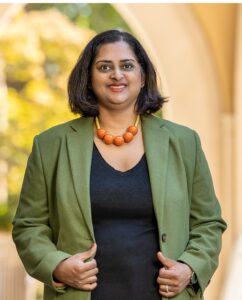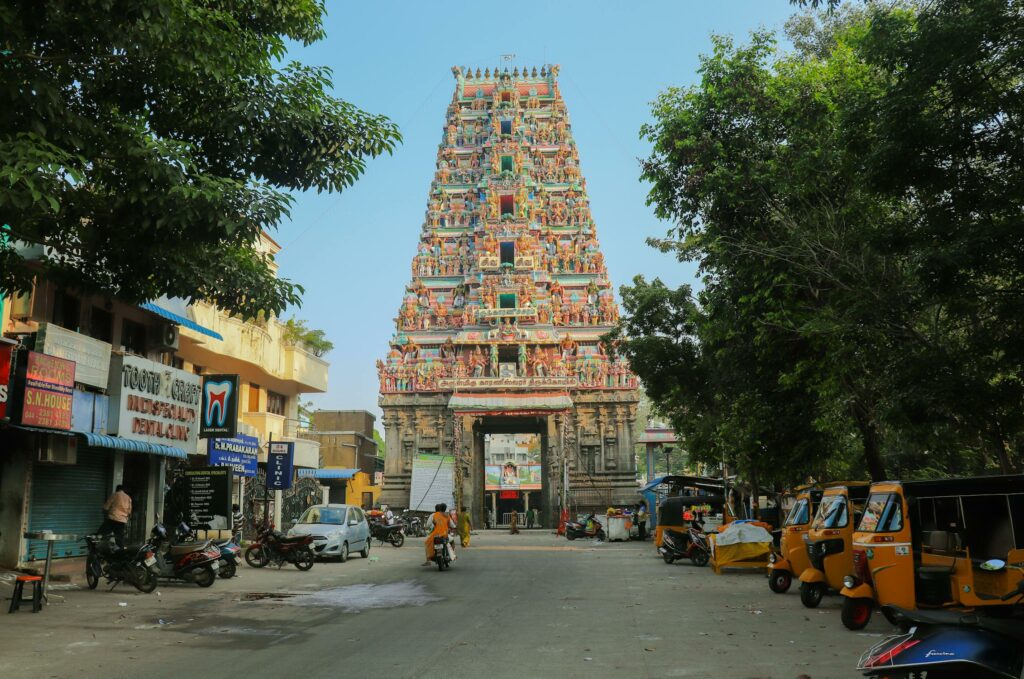The scenes in the poem “Madras” oscillate between the cultural corners of Madras (now called Chennai), India. From a meal at Karpagambal Cafe in the bang center of the city, where simplicity beckons at temples, crowded flower markets and tea stalls, the reader is wafted on a journey to the beach watching the sunset — hearing the heartbeats of a Ferris wheel, while popping in their mouths, groundnuts.
The hero buys chunks of jasmine malas, garlands that accentuate his sweetheart’s beauty.
As is customary in the lives of South Indians, some wake up to the chimes of the temple bells and have a moment with Lords Shiva, Vishnu, Ganesh and their companions. So, the couple in the poem circle around their deities, drink their holy water and pray for a good day.
In the author’s maternal home, typically decorated with Kolams, starry tattoos on the foyer floor made from rice flour, she steps on the dust of rising dreams into a future with her beloved holding hands, dreaming as they face the setting sun glazing the waves and the wet sands.
Madras
Tied in seventeen years of matrimony,
we lick the glazed onions and potatoes
of a masala dosa
from banana leaves at Karpagambal Café.
The scent and steamy ascent
of filtered coffee wraps around tunes
of the Tamil melody Ennavale.
He touches my swinging earrings
as I nod through tales of yesterday,
picking just the good ones,
the greener exits off the highway.
Breathless by the ocean, we watch
Earth’s blazing empress undress on miles of blue.
To heartbeats of the Ferris wheel,
we crack hot, roasted groundnuts,
glance at fluttering pigeons
and faraway people.
He pulls out three rupees for the jasmine braider,
tucks those flowers in my black curls,
smells the white, drooping malas
bounce in my hair
as we kick the wet sand on the pier.
Morning mantras resound
under the temple arches of Anna Nagar.
Garlands of marigolds sway to the singing breeze.
Devotees, we circle around the Ganesh deity,
break a coconut, drink the holy water
and make offerings for a good day.
We take a rickshaw to my mother’s brick cottage.
Crows caw on the neighbor’s wall
as we amble down the pebbled aisle.
A drop of dew slides on a hibiscus,
its yellow mellows even a passerby’s gloom.
I step on kolams, starry rice powder tattoos
on the foyer floor, dusting our rising dreams
of the shores of a white sand beach
dimmed by the dwindling sun,
where we curl our fingers
as the waves unfurl at our feet
and touch our breathing bodies.
 Born in Mumbai, India, Aruna Gurumurthy is a creative thinker, author, and poet. She has published seven books of poetry since 2015, her recent collection, a penning of love and motherhood that she’s read to children and seniors. Her poems appear in Bellevue Literary Review, storySouth, The Penwood Review, Redheaded Stepchild Magazine and others. Aruna was the runner-up for the 2022 Randall Jarrel Poetry Prize and a semifinalist in the 2022 and 2023 James Applewhite Poetry Prize. Aruna lives with her loving family in Chapel Hill, North Carolina and brings change in the world, one poem at a time. You can find more of her work here.
Born in Mumbai, India, Aruna Gurumurthy is a creative thinker, author, and poet. She has published seven books of poetry since 2015, her recent collection, a penning of love and motherhood that she’s read to children and seniors. Her poems appear in Bellevue Literary Review, storySouth, The Penwood Review, Redheaded Stepchild Magazine and others. Aruna was the runner-up for the 2022 Randall Jarrel Poetry Prize and a semifinalist in the 2022 and 2023 James Applewhite Poetry Prize. Aruna lives with her loving family in Chapel Hill, North Carolina and brings change in the world, one poem at a time. You can find more of her work here.
Chapelboro.com does not charge subscription fees, and you can directly support our efforts in local journalism here. Want more of what you see on Chapelboro? Let us bring free local news and community information to you by signing up for our newsletter.

